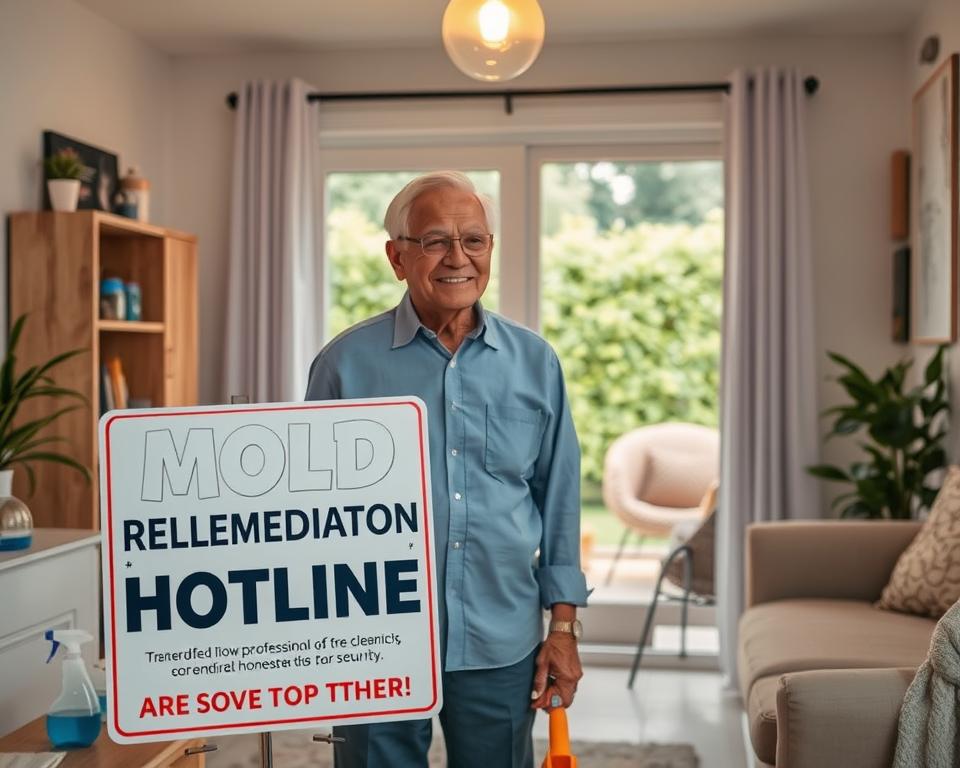Many older adults face a hidden danger in their own homes: mold contamination. This silent threat can lead to serious health issues, from respiratory problems to more severe complications. For elderly homeowners living on fixed incomes, addressing mold problems can be a significant financial challenge.
The good news is that there are programs and grants available to help seniors manage the costs of mold remediation. By exploring these options, elderly homeowners can protect their health and their home without breaking the bank. Immediate assistance is available by calling 332-220-0303 for a consultation with mold remediation experts.
Key Takeaways
- Understanding available programs can significantly reduce mold remediation costs.
- Elderly homeowners can access grants to help cover expenses.
- Prompt action is crucial to prevent health complications.
- Specialized services are available to assist seniors in managing mold issues.
- Financial assistance can help ensure thorough remediation.
Understanding the Mold Threat in Aging Homes
The threat of mold in older homes is often underestimated, yet it can have devastating effects on both the property and the well-being of its occupants. As homes age, structural weaknesses become more pronounced, creating an environment conducive to mold growth.
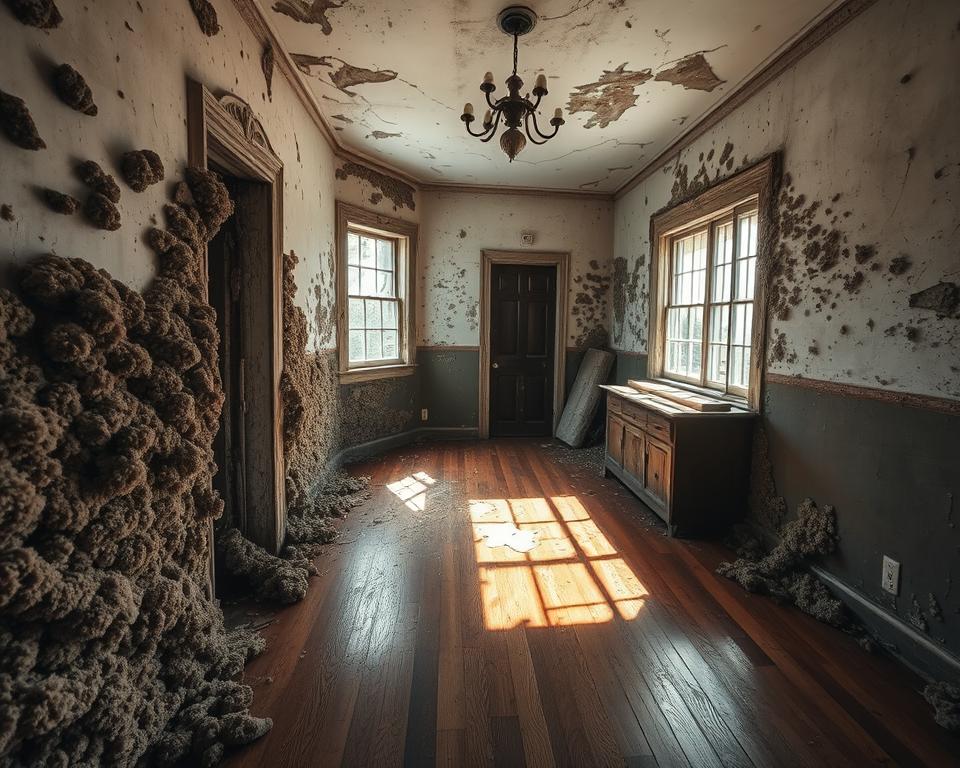
Aging homes typically feature outdated building materials and construction techniques that create ideal conditions for mold growth. Factors such as poor ventilation systems, deteriorating waterproofing, and leaky roofs contribute to this issue.
Common Causes of Mold in Older Properties
Mold growth in older properties is often the result of multiple factors, including:
- Deteriorating plumbing systems and inadequate insulation creating condensation points.
- Foundation cracks allowing moisture intrusion, which is a primary cause of mold growth.
- Homes built before 1980 often lack proper vapor barriers and have outdated HVAC systems that fail to control humidity levels effectively.
Why Elderly Homes Are More Susceptible to Mold Growth
Elderly homeowners may have limited mobility or health issues that prevent regular home maintenance, allowing small moisture problems to develop into significant mold infestations. The combination of fixed incomes and rising maintenance costs can lead to minor water intrusion issues going unaddressed, creating perfect conditions for extensive mold growth.
As stated by a FEMA disaster recovery report, “A six-month delay in addressing these issues can double repair costs.” This emphasizes the importance of prompt action in maintaining the safety and living conditions of aging homes.
Health Risks of Mold Exposure for Seniors
Mold exposure poses significant health risks to seniors, particularly in terms of respiratory complications. As people age, their lungs become less efficient at filtering out irritants, making them more susceptible to the adverse effects of mold spores in the air.

Respiratory Complications and Immune System Concerns
Seniors face heightened vulnerability to mold exposure due to age-related decline in their immune systems. Common symptoms include persistent coughing, wheezing, and nasal congestion, which can exacerbate existing conditions like asthma or COPD. The Centers for Disease Control and Prevention (CDC) reports that 21% of asthma cases worsen due to prolonged contact with airborne allergens, compromising the quality of air indoors.
Elderly individuals with compromised immune systems may develop serious infections when exposed to certain types of mold. This is particularly concerning for those with pre-existing health conditions, as their bodies are less capable of fighting off the adverse effects of mold exposure.
Long-Term Health Effects of Untreated Mold
Long-term exposure to mold can lead to chronic inflammatory response syndrome (CIRS), causing cognitive difficulties, fatigue, and systemic inflammation that particularly affects older adults. The presence of mycotoxins, toxic compounds produced by certain molds, can cause neurological symptoms, including memory problems and confusion.
| Health Risk | Description | Impact on Seniors |
|---|---|---|
| Respiratory Complications | Coughing, wheezing, nasal congestion | Exacerbates existing conditions like asthma or COPD |
| Immune System Decline | Increased susceptibility to infections | Serious infections in those with compromised immune systems |
| Long-Term Health Effects | CIRS, cognitive difficulties, fatigue | Affects older adults, causing systemic inflammation |
Maintaining good air quality is crucial for the health of seniors. Addressing mold issues promptly can significantly improve their quality of life and prevent the acceleration of age-related health complications.
Signs You Need Professional Mold Cleanup Services
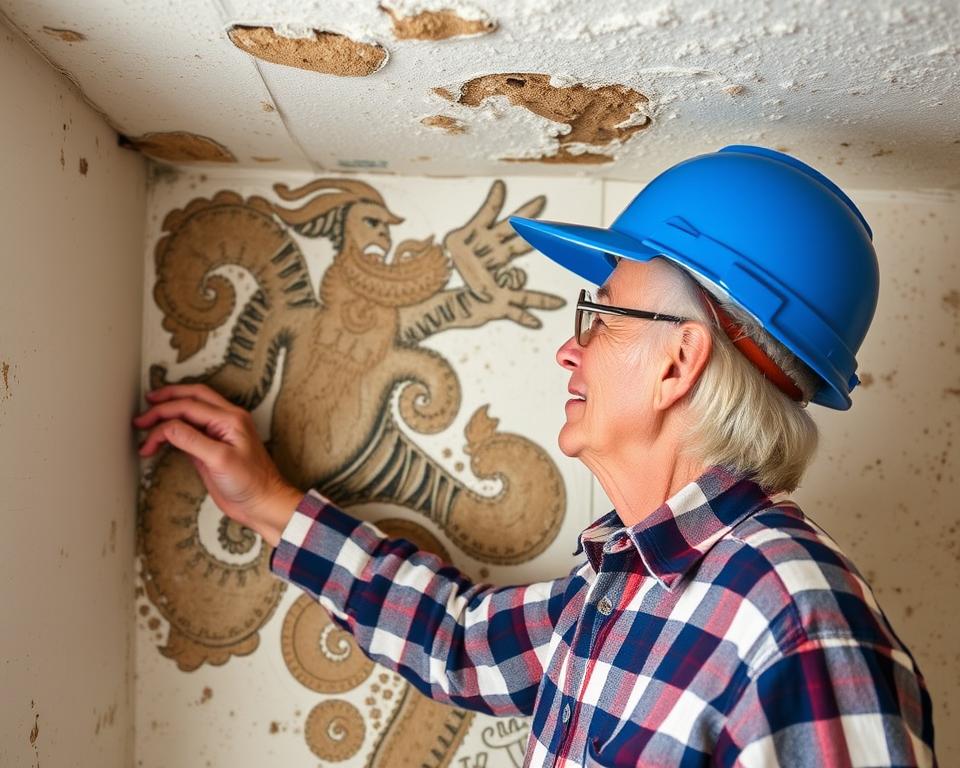
Recognizing the signs that indicate the need for professional mold cleanup is vital for elderly homeowners to ensure their home remains a healthy space. Mold can pose serious health risks, particularly for seniors, and addressing it promptly is crucial for maintaining a safe living environment.
Visual Indicators of Mold Infestation
Visual signs of mold include discoloration on walls, ceilings, or floors, particularly green, black, or white patches, peeling wallpaper or paint, and warping or bulging of building materials. These signs are clear indicators that professional mold cleanup services may be necessary.
Hidden Mold: When to Suspect Its Presence
Even without visible signs, mold can be present. Persistent musty odors, water stains, previous flooding, or ongoing moisture issues can indicate mold growth. Elderly homeowners should be vigilant about increased humidity levels and condensation on windows, as these conditions can lead to mold. If family members experience unexplained allergic reactions or respiratory issues that improve when away from home, it may indicate hidden mold. Ensuring safety and air quality is paramount.
For immediate assessment and to schedule a professional consultation, elderly homeowners can call 332-220-0303. Early detection significantly reduces remediation costs and health risks, making it a crucial step in maintaining a safe and healthy home environment.
The Cost of Mold Remediation for Elderly Homeowners
Mold cleanup costs vary widely, and elderly homeowners need to be aware of the factors that influence these costs. The financial burden of mold remediation can be significant, especially for seniors living on fixed incomes.
The severity of mold contamination plays a crucial role in determining the overall cost of remediation. Minor surface cleaning projects can range from $500 to $1,500, while extensive structural remediation can cost between $10,000 and $30,000 or more.
Average Price Ranges for Different Levels of Contamination
The cost of mold remediation is directly related to the extent of the contamination. For instance, minor issues that are addressed early can prevent more costly repairs down the line. As an example, a $500 attic patch can escalate into $5,000 worth of wall replacements if mold spores spread to framing materials.
| Level of Contamination | Average Cost |
|---|---|
| Minor Surface Cleaning | $500-$1,500 |
| Moderate Contamination | $1,500-$5,000 |
| Extensive Structural Remediation | $10,000-$30,000+ |
Factors That Influence Mold Cleanup Pricing
Several factors contribute to the overall costs of mold remediation for homeowners. These include the type of mold present, with toxic black mold requiring more expensive remediation; the materials affected, as porous surfaces like drywall often need replacement; and the location of the mold within the home.
According to industry experts, “The price of mold remediation is not just about the immediate fix; it’s about preventing future issues that can arise from neglecting the problem.” Early intervention can significantly reduce the overall amount spent on remediation.
“Minor issues become major expenses when ignored. A $500 attic patch can balloon into $5,000 in wall replacements if spores reach framing materials.”
The comprehensive nature of professional mold remediation, including containment, air filtration, removal, cleaning, and preventive treatments, contributes to the overall project cost. However, this ensures the thorough elimination of health hazards, providing a safe and healthy environment for elderly homeowners.

Mold Cleanup Discounts for Elderly Homeowners

Elderly homeowners can benefit from various discounts on mold cleanup services. Many professional mold remediation companies offer senior citizen discounts, recognizing the financial constraints many elderly homeowners face.
Types of Senior Discounts Available in the Industry
Industry-specific discounts often include reduced-cost or complimentary pre-remediation inspections and testing for homeowners over 65. This can save seniors $300-$800 in initial assessment fees. Some companies also offer bundled service packages designed specifically for seniors, combining remediation with preventive treatments at discounted rates.
These packages provide comprehensive solutions that address both immediate and long-term concerns. For example, some remediation companies partner with senior organizations like AARP to offer member-exclusive discounts, making membership in these organizations valuable for accessing industry savings.
How to Qualify for Age-Based Remediation Discounts
Qualifying for age-based remediation discounts typically requires simple age verification through government-issued identification. Most companies set eligibility at 62 or 65 years of age. Elderly homeowners can maximize available discounts by calling 332-220-0303 for a consultation that includes information about current promotional offers and senior-specific pricing options.
Seasonal promotions specifically targeting elderly homeowners may provide additional savings during slower business periods, typically during fall and winter months when remediation companies have more scheduling flexibility.
To take advantage of these discounts, elderly homeowners should inquire about available promotions when scheduling their mold remediation services. By doing so, they can significantly reduce the financial burden of mold cleanup.
Government Assistance Programs for Mold Remediation
The U.S. government offers various programs to help elderly homeowners address mold issues in their homes, particularly those with limited financial resources. Mold remediation can be a costly endeavor, but there are grants and assistance programs designed to alleviate this financial burden.
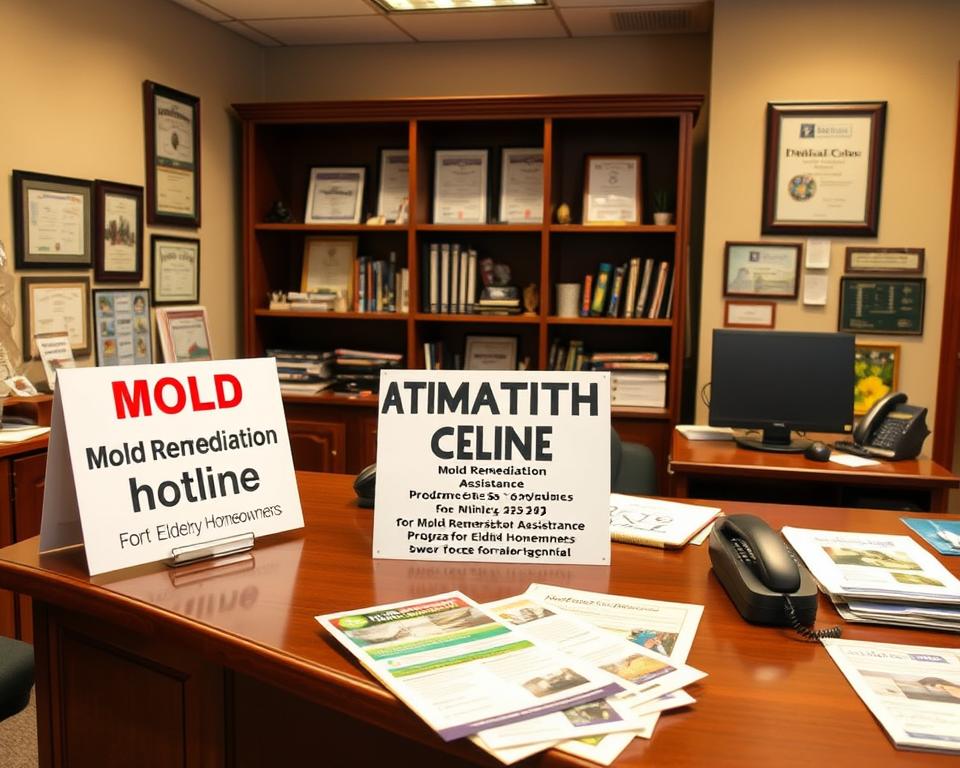
USDA Single Family Housing Repair Grants
The USDA Single Family Housing Repair Grants program is a valuable resource for elderly homeowners living in rural areas. This program provides financial assistance to homeowners aged 62 and older with incomes below the area median. The grants can be used for essential repairs, including mold remediation, to improve home safety and address health hazards.
Key benefits of the USDA Single Family Housing Repair Grants include:
- Up to $10,000 in financial assistance for eligible homeowners.
- No requirement for credit checks or collateral beyond the home itself.
- Grants can be applied directly to mold remediation as part of essential home repairs.
To qualify, applicants must own and occupy their homes, located in eligible rural areas, and meet the income and age requirements. It’s also important to note that if the home is sold within three years of receiving the grant, the funds must be repaid.
Section 504 Home Repair Program Benefits
The Section 504 Home Repair Program offers both grants and loans to low-income homeowners aged 62 and older. This program is particularly beneficial for seniors dealing with mold issues, as it provides financial assistance for necessary home repairs. The loans have a 1% interest rate and a 20-year term, making them highly accessible.
The combination of grants and loans under the Section 504 Home Repair Program can provide up to $50,000 in total assistance. This can be crucial for addressing extensive mold damage and ensuring the home is safe and healthy for occupancy.
Application for these programs requires documentation of age, income, homeownership, and proof that the repairs are necessary for health and safety. Local USDA Rural Development offices provide assistance with the application process, making it more manageable for seniors.
By leveraging these government assistance programs, elderly homeowners can access the financial aid they need to tackle mold remediation and other essential home repairs, improving their quality of life and the safety of their living environment.
Special Financing Options for Senior Homeowners
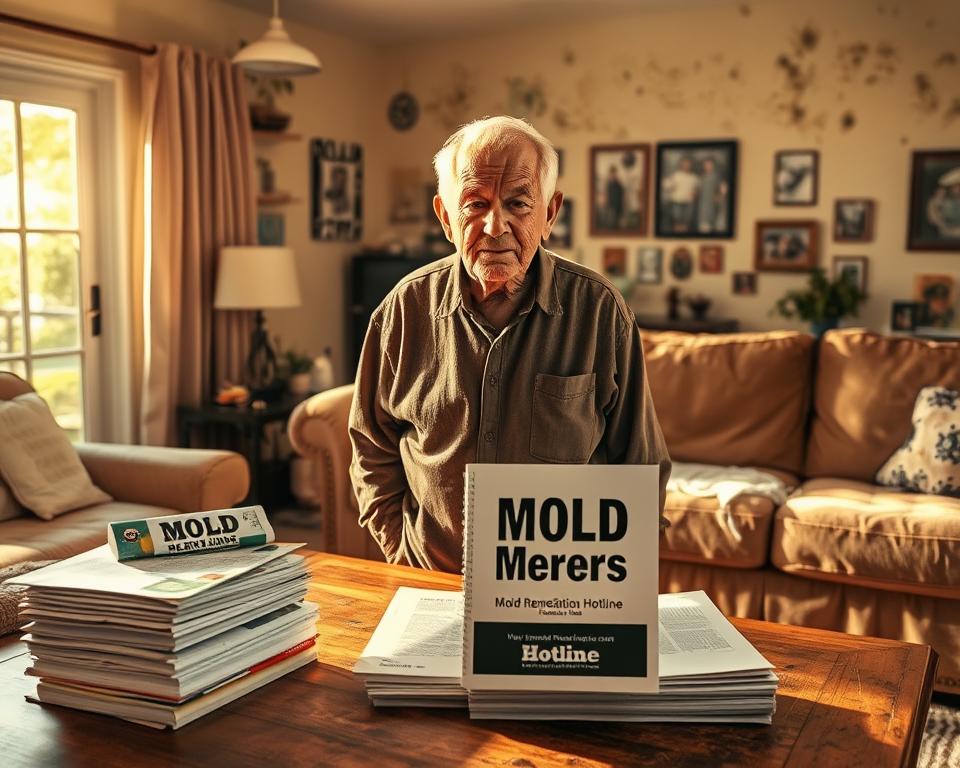
The financial strain of mold remediation can be alleviated for senior homeowners through tailored financing options and loan programs. Understanding these options is crucial for managing the costs associated with mold cleanup.
Low-Interest Loans for Home Health Hazard Removal
Low-interest loans are available specifically for elderly homeowners to address health hazards like mold in their homes. These loans offer more favorable terms compared to standard loan options.
Key Benefits:
- Low-interest rates as low as 1% compared to traditional loans at 5-7%
- Significant savings over the loan term; for example, a $10,000 loan at 1% interest costs approximately $1,600 less over five years than the same loan at 3%
- Government-backed options like USDA loans provide fixed rates, keeping monthly payments manageable
Payment Plans Designed for Fixed-Income Budgets
Payment plans tailored for seniors on fixed incomes can greatly ease the financial burden of mold remediation. These plans often feature extended terms, reducing monthly obligations.
Notable Features:
- Deferred payment options allowing seniors to postpone initial payments for 60-90 days
- Extended payment terms, up to 20 years for some government programs, to reduce monthly payments
- No prepayment penalties, enabling seniors to pay off loans early without additional fees when their financial situation improves
- Flexible qualification criteria considering factors beyond credit scores, such as long-term homeownership and payment history
By exploring these financing options, senior homeowners can address mold remediation needs without straining their budgets. It’s essential to review and compare the available programs to find the most suitable one.
Home Repair Grants Specifically for Elderly Residents
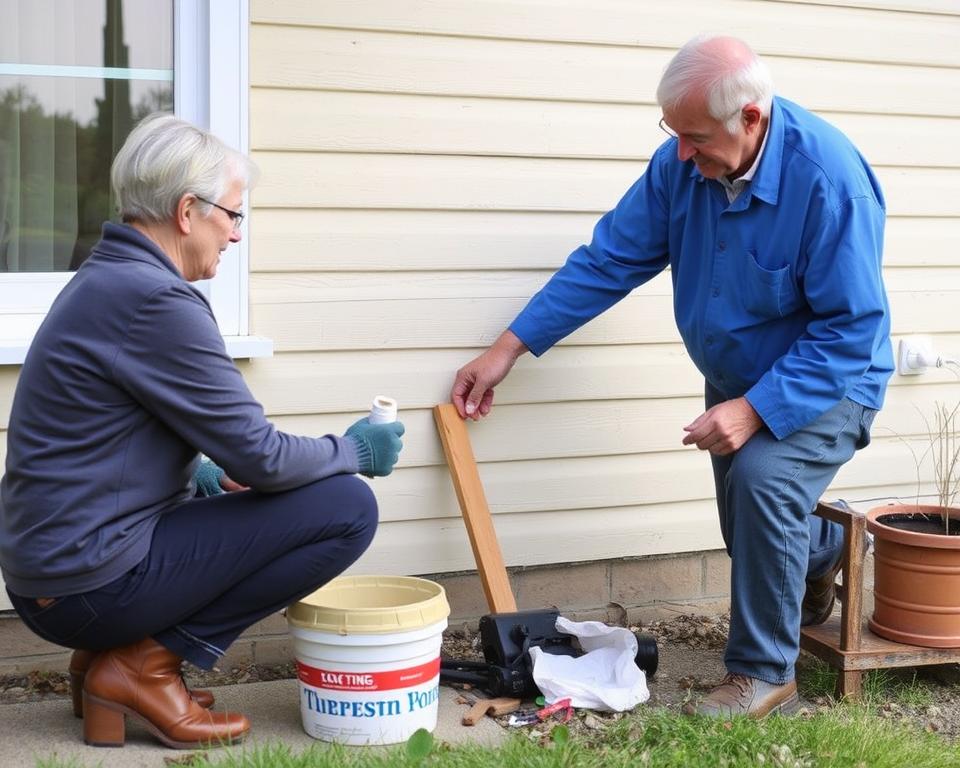
Home repair grants for elderly residents offer a vital lifeline for seniors dealing with health hazards like mold in their homes. These grants provide non-repayable funds to address various home repairs, including mold remediation, making it easier for elderly homeowners to maintain a safe living environment.
Eligibility Requirements for Senior Housing Grants
To qualify for these grants, elderly residents must meet specific eligibility requirements. Typically, these include being 60 years or older, having a low income, and owning their home. Income limits usually apply, with eligibility often restricted to those with incomes below 80% of the area median income.
The application process also requires proof of age, income verification, and homeownership documentation. Seniors must demonstrate their need for the grant, often by showing how the repair directly impacts their health and safety.
Application Process and Documentation Needed
The application process for home repair grants involves thorough documentation. Applicants must provide proof of age, typically through a government ID, and income verification via tax returns or benefit statements. Homeownership must be documented with deed or mortgage statements.
Additionally, seniors need to obtain contractor estimates for the proposed remediation work. Many programs offer assistance with the application process, helping elderly applicants navigate the complex paperwork and increasing their chances of approval.
By understanding the eligibility requirements and application process, elderly residents can successfully access these grants to improve their living conditions.
Community and Nonprofit Support for Mold Cleanup
Elderly homeowners can find valuable support in community and nonprofit programs designed to tackle mold issues. Local networks often provide unexpected solutions for maintaining safe living environments. Beyond government programs, grassroots efforts play a vital role in addressing household challenges.
Local Organizations Offering Assistance to Seniors
Community-based organizations like Habitat for Humanity and Rebuilding Together provide specialized assistance programs for elderly homeowners facing mold issues, often at significantly reduced costs or even free of charge. These nonprofit initiatives leverage volunteer labor from skilled professionals, including certified mold remediation specialists who donate their expertise to help vulnerable seniors.
Volunteer Programs for Elderly Home Maintenance
Faith-based organizations often coordinate volunteer maintenance programs specifically targeting elderly community members, with some offering emergency response teams for urgent situations like water damage that could lead to mold. Many communities have established “senior safe home” initiatives that combine volunteer labor with donated materials to address health hazards like mold in elderly residents’ homes.
| Organization | Services Offered | Target Beneficiaries |
|---|---|---|
| Habitat for Humanity | Free assessments and repair services | Elderly homeowners |
| Rebuilding Together | Mold remediation and home repairs | Vulnerable seniors |
| Local Area Agencies on Aging | Resource directories for environmental hazards | Seniors seeking help |
These community-based programs often work in conjunction with government assistance, helping seniors navigate application processes while providing immediate support during waiting periods. By leveraging local resources and volunteer expertise, these initiatives create impactful change in the lives of elderly homeowners.
The Professional Mold Remediation Process
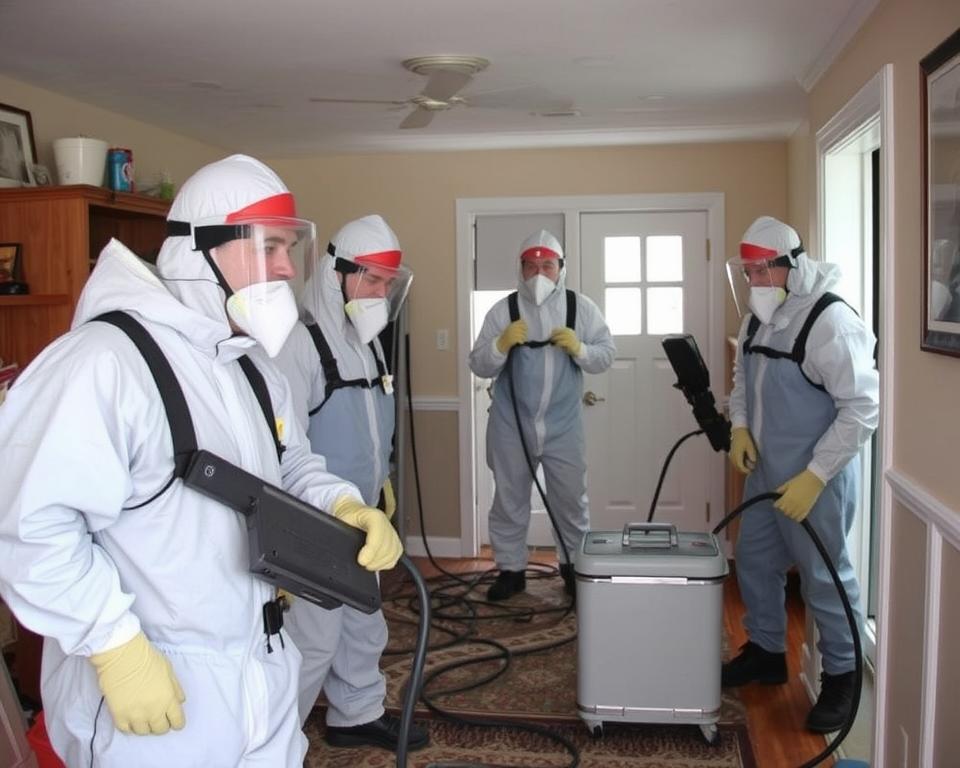
The professional mold remediation process is a multi-step procedure designed to effectively remove mold and prevent future growth in homes, especially for seniors. This comprehensive approach ensures that the mold issue is fully addressed, providing a safe and healthy environment for elderly homeowners.
Initial Assessment and Containment Procedures
The process begins with a thorough assessment to identify the extent of contamination, moisture sources, and affected materials. This step is crucial in establishing a detailed remediation plan tailored to the specific situation. Containment procedures involve isolating the affected areas using plastic sheeting, negative air pressure systems, and HEPA filtration to prevent cross-contamination throughout the home during the remediation process.
Removal, Cleaning, and Prevention Steps
The removal phase includes carefully eliminating contaminated materials that cannot be salvaged, following strict protocols to minimize spore dispersal and protect the elderly resident’s health. Cleaning procedures utilize specialized antimicrobial solutions and HEPA vacuuming to eliminate mold from salvageable surfaces. Prevention steps address the underlying moisture issues through repairs, improved ventilation, dehumidification, and waterproofing to ensure mold doesn’t return after remediation.
Post-Remediation Verification and Testing
Post-remediation verification includes visual inspection, moisture measurements, and air quality testing to confirm successful elimination of the mold problem and restoration of healthy indoor air quality. For a detailed explanation of the professional remediation process or to schedule an assessment, elderly homeowners can call 332-220-0303 to speak with certified remediation specialists.
By understanding the professional mold remediation process, seniors can better navigate the challenges of mold infestation and ensure their homes remain safe and healthy. This includes cleaning and removal techniques, as well as prevention strategies to avoid future mold growth.
DIY vs. Professional Mold Cleanup for Seniors
When it comes to mold cleanup, elderly homeowners often face a critical decision: whether to attempt a DIY solution or hire professionals. This decision is crucial due to the potential health risks associated with mold exposure.
Safety Concerns for Elderly Attempting Self-Remediation
DIY mold cleanup presents significant safety concerns for elderly individuals. Exposure to airborne mold spores can trigger respiratory distress, allergic reactions, and exacerbate existing health conditions. For example, seniors with pre-existing respiratory issues are particularly vulnerable to the adverse effects of mold exposure.
Furthermore, physical limitations common among seniors, such as reduced mobility and decreased strength, increase the risk of injury when attempting to access contaminated areas or handle remediation equipment. Many over-the-counter mold cleaning products contain harsh chemicals that can cause additional health complications.
When Professional Help Is Non-Negotiable
Professional remediation becomes necessary when mold covers areas larger than 10 square feet, involves toxic black mold, affects HVAC systems, or has penetrated structural components of the home. Water damage from plumbing failures or flooding also requires professional intervention due to the extensive nature of potential contamination.
| Situation | DIY Risk Level | Recommended Action |
|---|---|---|
| Mold covers over 10 sq. ft. | High | Professional Remediation |
| Involves toxic black mold | Very High | Professional Remediation |
| Affects HVAC systems | High | Professional Remediation |
| Water damage from flooding | Very High | Professional Remediation |
For elderly homeowners, the health protection and comprehensive solutions provided by professional remediation services justify the investment, compared to the risks of self-remediation attempts. Ensuring air quality and safety is paramount.
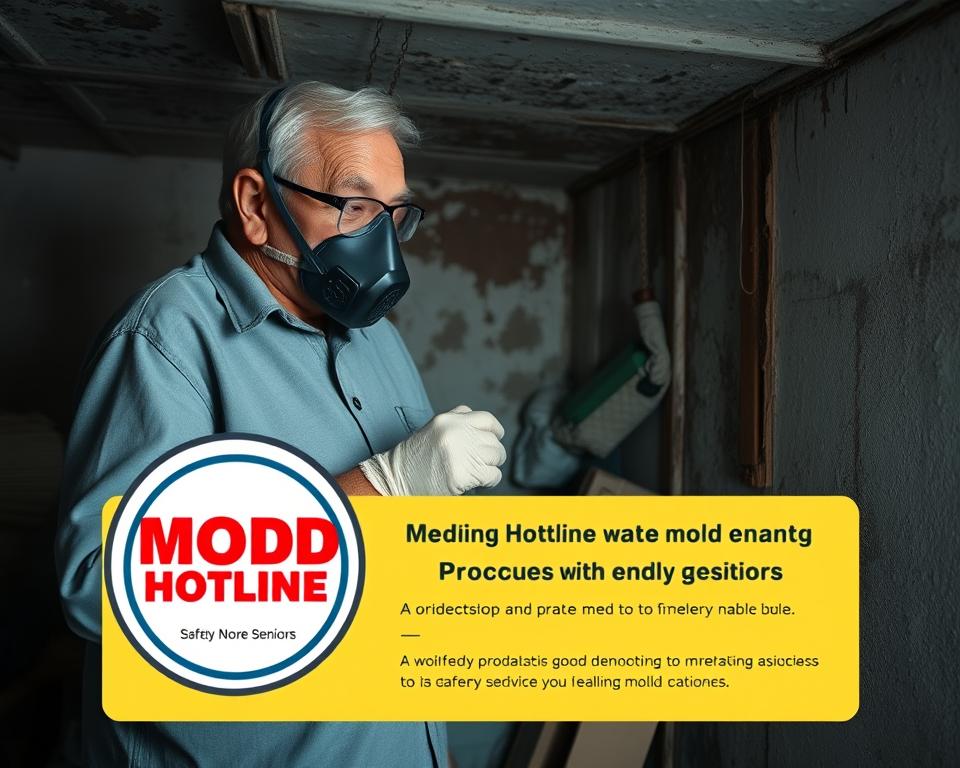
Insurance Coverage for Mold Damage in Senior Homes

Insurance coverage for mold damage is a critical consideration for senior homeowners, who are more vulnerable to the health risks associated with mold. Understanding the intricacies of insurance policies can help seniors navigate the complex process of filing claims for mold remediation.
Understanding Policy Limitations and Exclusions
Standard homeowners insurance policies often have limitations or exclusions for mold damage. Typically, these policies only cover mold remediation when it results directly from a covered peril, such as burst pipes or storm damage. For instance, if a pipe bursts due to freezing temperatures, the resulting mold damage might be covered under the policy.
Policy limitations often include specific mold damage caps, ranging from $1,000 to $10,000. However, extensive remediation projects in aging properties can exceed these amounts, leaving homeowners with significant out-of-pocket expenses. Many insurers offer additional mold coverage endorsements, which seniors should consider, especially for older homes with higher moisture vulnerability.
How to File a Successful Mold Damage Claim
Filing a successful mold damage claim requires thorough documentation. This includes photographs of the damage, professional assessment reports, remediation estimates, and clear evidence linking the mold to a covered event. For example, documenting water leaks and subsequent mold growth can be crucial in supporting a claim.
Elderly homeowners should report potential mold-causing incidents to their insurance company immediately. Delays can result in claim denials based on failure to mitigate further damage. Working with public adjusters who specialize in mold claims can significantly increase approval chances, as they understand policy language and documentation requirements.
When insurance coverage is denied or insufficient, seniors should explore financial assistance programs designed for elderly homeowners facing environmental hazards. Understanding these options can provide additional support for seniors dealing with mold damage.
Preventing Future Mold Problems After Remediation
To maintain a healthy living space, seniors must implement measures to prevent mold regrowth. Proactive home care forms the foundation of healthy living environments, and addressing potential risks early minimizes costly interventions while safeguarding indoor air quality.
Moisture Control Strategies for Aging Properties
Effective moisture control is crucial in preventing mold growth in aging properties. Strategies include:
- Installing proper ventilation systems in high-humidity areas like bathrooms and kitchens, with exhaust fans vented to the exterior.
- Using dehumidifiers, particularly in basements and crawl spaces, to maintain humidity levels between 30-50%.
- Addressing water intrusion points through foundation sealing, proper gutter maintenance, and landscape grading away from the home.
Regular Maintenance Tips for Mold-Free Living
Regular maintenance routines are essential for mold-free living. This includes:
- Quarterly inspections of potential problem areas, such as under sinks, around windows, and in attics.
- Proper insulation upgrades to prevent condensation on cold surfaces.
- Simple lifestyle adjustments, like using bathroom fans for 30 minutes after showering and maintaining consistent indoor temperatures.
By implementing these strategies, elderly homeowners can significantly reduce the risk of future mold growth, ensuring a healthier and safer living environment.
Questions to Ask Before Hiring a Mold Remediation Company
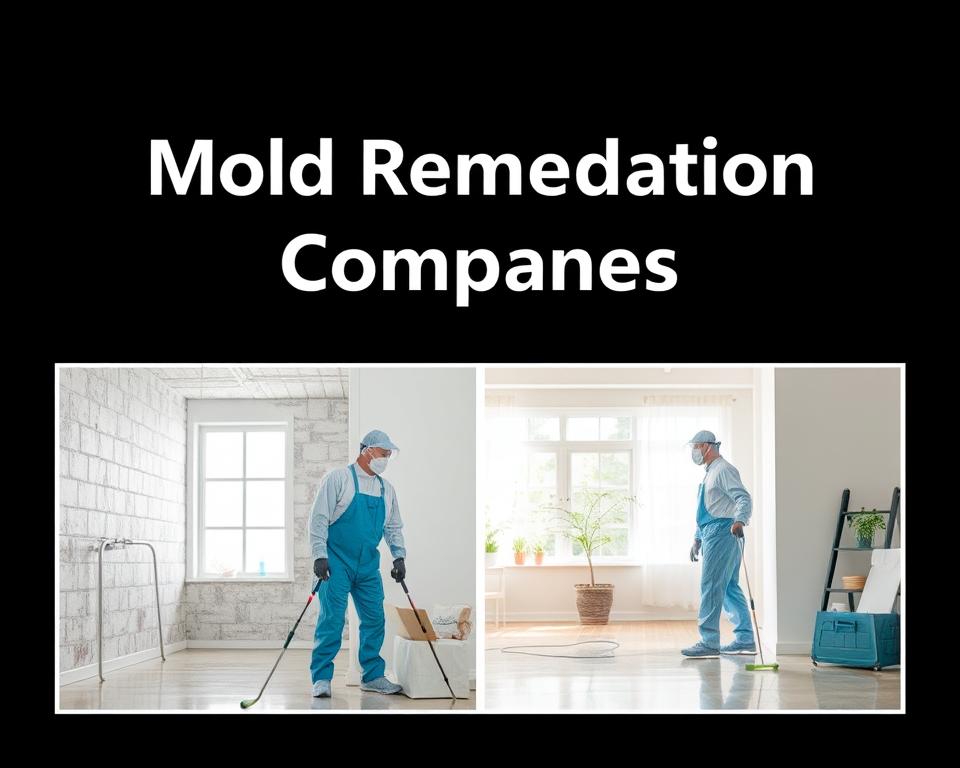
Elderly homeowners should ask the right questions before hiring a mold remediation company. This ensures they receive quality service tailored to their needs.
Certification and Experience Requirements
When interviewing potential mold remediation companies, elderly homeowners should inquire about specific certifications such as the Institute of Inspection Cleaning and Restoration Certification (IICRC) or National Organization of Remediators and Mold Inspectors (NORMI) credentials. Experience is crucial; questions should focus on the company’s history with similar projects in older homes and their familiarity with common structural issues that affect mold remediation in aging properties.
Senior-Specific Services to Look For
Elderly homeowners should look for companies offering senior-specific services, including flexible payment options designed for fixed incomes, assistance with insurance documentation, and coordination with aging-in-place modifications during the remediation process. Companies that provide clear communication practices, such as large-print documentation and designated contact persons, demonstrate a consideration for seniors’ needs.
Red Flags and Warning Signs to Avoid
There are several red flags to watch out for when hiring a mold remediation company. These include pressure tactics for immediate decisions, significantly lower estimates than competitors (which may indicate corners being cut), lack of proper licensing, and unwillingness to provide references from previous elderly clients. For assistance finding qualified remediation specialists with senior-friendly services, call 332-220-0303 for personalized recommendations and consultation.
Case Studies: Successful Mold Remediation for Elderly Homeowners
Through a series of case studies, we can identify best practices and strategies that have proven successful in mold remediation for seniors. These examples not only demonstrate the effectiveness of various approaches but also highlight the importance of timely intervention and creative financing solutions.
Affordable Remediation Examples
Several real-life examples illustrate the potential for affordable mold remediation among elderly homeowners. For instance, a 78-year-old widow in Michigan utilized the USDA Section 504 program to secure a $7,500 grant for black mold remediation in her basement. This not only eliminated her chronic respiratory symptoms but also preserved her limited retirement savings. In another case, an elderly couple in Florida combined a senior discount program from a local remediation company with a low-interest loan from their credit union, reducing their $12,000 remediation project cost by nearly 30%.
Lessons from Successful Cases
Key lessons learned from these successful cases include the importance of obtaining multiple quotes, exploring combined funding sources, and prioritizing companies with experience working with senior assistance programs. Best practices identified through these case studies emphasize thorough documentation of health impacts for grant applications, scheduling work in phases to manage costs, and addressing underlying moisture issues simultaneously with remediation. These strategies have enabled elderly homeowners to achieve successful, affordable remediation through a combination of discounts, government assistance, community resources, and strategic project planning.
Conclusion: Taking Action Against Mold in Senior Homes
The presence of mold in senior homes is not just a matter of property damage; it’s a serious health concern that requires immediate action. Elderly homeowners must be proactive in identifying and addressing mold issues to prevent minor problems from escalating into major remediation projects that can be costly and stressful.
Fortunately, there are various resources available to help seniors tackle mold contamination. By leveraging grants, assistance programs, and specialized financing options, elderly homeowners can significantly reduce the financial burden of professional mold cleanup. It’s crucial for seniors to explore these options and create a personalized action plan that combines appropriate financial resources with qualified remediation professionals.
Prioritizing health and safety is paramount. Seniors should seek professional help rather than attempting DIY remediation, given the potential respiratory risks. After remediation, implementing preventive strategies is key to maintaining a healthy living environment in the home. For personalized guidance on addressing mold issues and information about available discounts and assistance programs, elderly homeowners can call 332-220-0303 to consult with experienced remediation specialists.
By taking prompt and informed action, seniors can protect their home and their health, ensuring a safer and healthier living space. Utilizing the available programs and resources can make a significant difference in the remediation process.
